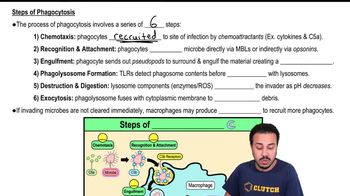If the following are placed in the order of occurrence, which would be the third step?
a. activation of C5 through C9
b. cell lysis
c. antigen–antibody reaction
d. activation of C3
e. activation of C2 through C4
 Tortora 14th Edition
Tortora 14th Edition Ch. 16 - Innate Immunity: Nonspecific Defenses of the Host
Ch. 16 - Innate Immunity: Nonspecific Defenses of the Host Problem 16.6a
Problem 16.6a Verified step by step guidance
Verified step by step guidance



If the following are placed in the order of occurrence, which would be the third step?
a. activation of C5 through C9
b. cell lysis
c. antigen–antibody reaction
d. activation of C3
e. activation of C2 through C4
Patients with X-linked chronic granulomatous disease are susceptible to infections because their neutrophils don’t generate an oxidative burst. What is the relation of the oxidative burst to infection?
Why does hemolysis of red blood cells occur when a person receives a transfusion of the wrong type of blood?
Give several examples of how microbes evade the complement system.
In 1884, Elie Metchnikoff observed cells collected around a splinter inserted in a sea star embryo. This was the discovery of
a. blood cells.
b. sea stars.
c. phagocytosis.
d. immunity.
e. none of the above
DRAW IT Label on the figure the following processes that result in phagocytosis: margination, diapedesis, adherence, and phagolysosome formation.
<IMAGE>